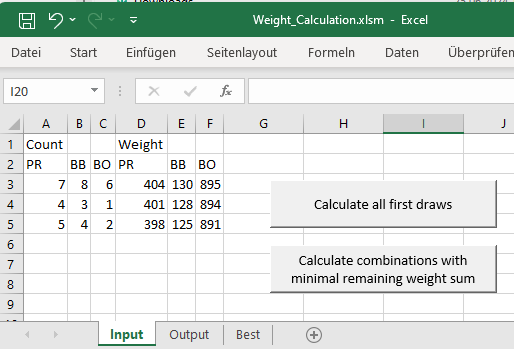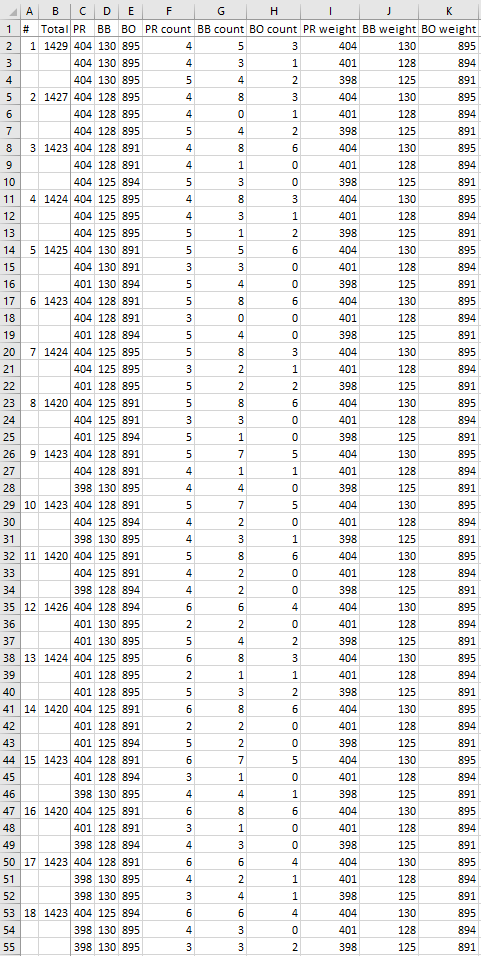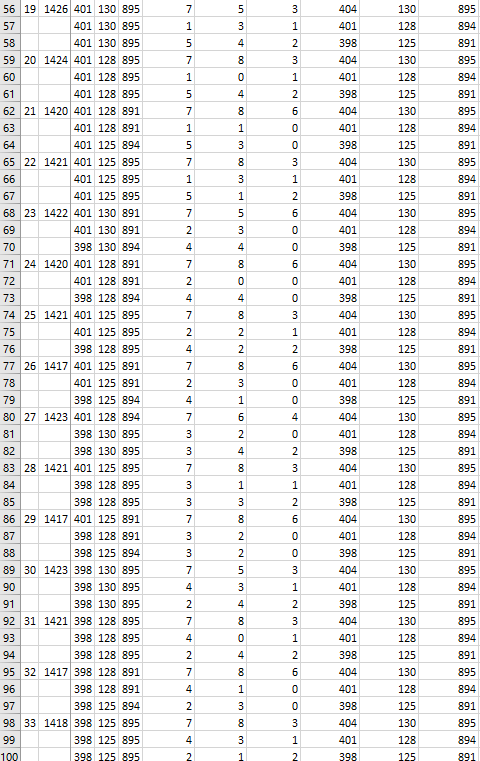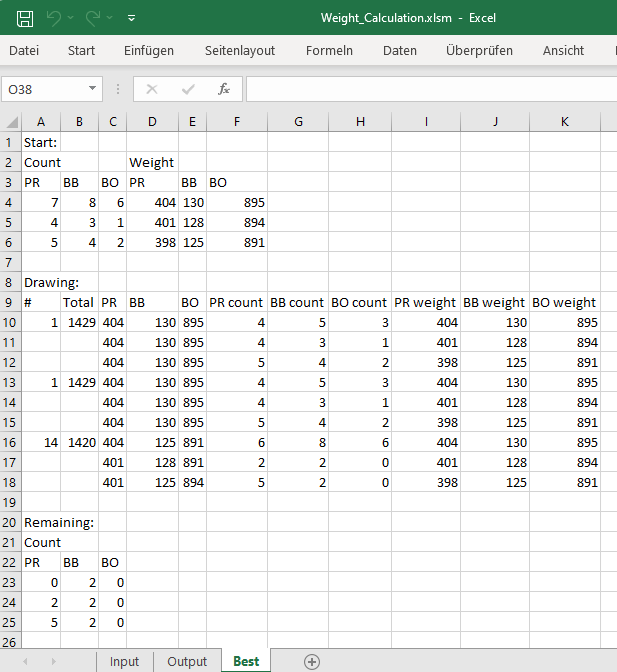Abstract
Angenommen, Sie haben drei verschiedene Produkte in jeweils 3 Ausprägungen mit unterschiedlichen Gewichten, die auch in unterschiedlicher Anzahl vorliegen. Das Produkt PR existiert mit den Gewichten 404 g (davon gibt es 7 Stück), 401 g (vier Mal) und 398 g (fünf Mal), und es gibt entsprechend weitere Produkte BB und BO:

Nun sollen jeweils drei mal drei Produkte (immer von allen drei Produkten genau eins) mit identischer Gewichtssumme ermittelt und die Restmenge an Produkten ausgegeben werden:


Es gibt viele Alternativen, alle möglichen Entnahmen zu ermitteln. Im Anhang ist eine sehr einfache, aber recht aufwendige Option genannt (siehe erste Download Datei), die naiv alle möglichen Kombinationen durchgeht. Die zweite Download Datei zeigt eine Monte Carlo Simulation, die die Funktion UniqRandInt verwendet und mit 500.000 Iterationen sehr wahrscheinlich (aber nicht sicher) alle Möglichkeiten ermittelt. Eine dritte Möglichkeit bestünde in der Nutzung der Funktion ), um alle möglichen 84 * 84 * 20 = 141,120 Permutationen durchzugehen.
Eine (von 12 verschiedenen) kombinierte Entnahme mit der geringsten Restgewichtssumme ist:

Alle 12 verschiedenen Entnahmekombinationen - die Nummern beziehen sich auf die o. g. Ausgabevariante:
| Erste Ziehung | Zweite Ziehung | Dritte Ziehung |
|---|---|---|
| 1 | 1 | 14 |
| 1 | 1 | 16 |
| 1 | 1 | 21 |
| 1 | 1 | 24 |
| 1 | 2 | 23 |
| 1 | 3 | 19 |
| 1 | 5 | 7 |
| 1 | 5 | 13 |
| 1 | 5 | 20 |
| 1 | 6 | 19 |
| 1 | 9 | 12 |
| 2 | 5 | 19 |
Appendix – Programmcode AllFirstDraws und CombinationsWithMinRemainingWeight
Bitte den Haftungsausschluss im Impressum beachten.
Option Explicit
'Calculates 3 * 3 - tuples of same total weights.
'Source (EN): https://www.sulprobil.de/weight_calculation_en/
'Source (DE): https://www.berndplumhoff.de/gewichtberechnung_de/
'(C) (P) by Bernd Plumhoff 26-Jun-2024 PB V0.4
Sub AllFirstDraws()
Dim i As Long
Dim j As Long
Dim k As Long
Dim i2 As Long
Dim j2 As Long
Dim k2 As Long
Dim i3 As Long
Dim j3 As Long
Dim k3 As Long
Dim m As Long
Dim n As Long
Dim t As Long
Dim v As Long
Dim oGetRidofDupes As Object
Dim vCount As Variant
Dim vWeight As Variant
Dim state As SystemState
With Application.WorksheetFunction
Set state = New SystemState
wsI.Cells.EntireColumn.AutoFit
wsO.Cells.ClearContents
Set oGetRidofDupes = CreateObject("Scripting.Dictionary")
i = 1
Do While wsI.Cells(2, i) <> ""
i = i + 1
Loop
n = (i - 1) \ 2
vCount = .Transpose(Range(wsI.Cells(3, 1), wsI.Cells(3, n).End(xlDown)))
vWeight = .Transpose(Range(wsI.Cells(3, n + 1), wsI.Cells(3, 2 * n).End(xlDown)))
For i = 1 To n
k = 0
For j = 1 To UBound(vCount, 2)
k = k + vCount(j, i)
Next j
If k < n Then
Call MsgBox("Not enough items in column " & i, vbOKOnly, "Error")
Exit Sub
End If
Next i
m = j - 1
'Debug.Print "n = " & n, "m = " & m
'Now we know the dimensions
ReDim sItem(1 To n) As String
wsO.Cells(1, 1) = "#"
wsO.Cells(1, 2) = "Total"
For i = 1 To n
sItem(i) = wsI.Cells(2, i)
wsO.Cells(1, i + 2) = sItem(i)
wsO.Cells(1, n + 2 + i) = sItem(i) & " count"
wsO.Cells(1, 2 * n + 2 + i) = sItem(i) & " weight"
Next i
ReDim lPermutWeight(1 To n, 1 To n * m) As Long
ReDim lPermutIdx(1 To n) As Long
ReDim lPermutSubGroupIdx(1 To n, 1 To n * m) As Long
For i = 1 To n
t = 0
For j = 1 To m
For k = 1 To .Min(n, vCount(i, j))
t = t + 1
lPermutWeight(i, t) = vWeight(i, j)
lPermutSubGroupIdx(i, t) = j
Next k
Next j
lPermutIdx(i) = t
Next i
v = 2
For i = 1 To lPermutIdx(1)
For j = 1 To lPermutIdx(1)
If j <> i Then
For k = 1 To lPermutIdx(1)
If k <> j And k <> i Then
For i2 = 1 To lPermutIdx(2)
For j2 = 1 To lPermutIdx(2)
If j2 <> i2 Then
For k2 = 1 To lPermutIdx(2)
If k2 <> j2 And k2 <> i2 Then
For i3 = 1 To lPermutIdx(3)
For j3 = 1 To lPermutIdx(3)
If j3 <> i3 Then
For k3 = 1 To lPermutIdx(3)
If k3 <> j3 And k3 <> i3 Then
'Debug.Print lPermutWeight(1, i) & " + " & lPermutWeight(2, i2) & " + " & lPermutWeight(3, i3) & " ?= " & lPermutWeight(1, j) & " + " & lPermutWeight(2, j2) & " + " & lPermutWeight(3, j3) & " And " & lPermutWeight(1, i) & " + " & lPermutWeight(2, i2) & " + " & lPermutWeight(3, i3) & " ?= " & lPermutWeight(1, k) & " + " & lPermutWeight(2, k2) & " + " & lPermutWeight(3, k3)
If lPermutWeight(1, i) + lPermutWeight(2, i2) + lPermutWeight(3, i3) = _
lPermutWeight(1, j) + lPermutWeight(2, j2) + lPermutWeight(3, j3) And _
lPermutWeight(1, i) + lPermutWeight(2, i2) + lPermutWeight(3, i3) = _
lPermutWeight(1, k) + lPermutWeight(2, k2) + lPermutWeight(3, k3) Then
If Not oGetRidofDupes.exists(lPermutWeight(1, i) & "|" & lPermutWeight(2, i2) & "|" & lPermutWeight(3, i3) & "|" & _
lPermutWeight(1, j) & "|" & lPermutWeight(2, j2) & "|" & lPermutWeight(3, j3) & "|" & _
lPermutWeight(1, k) & "|" & lPermutWeight(2, k2) & "|" & lPermutWeight(3, k3)) Then
oGetRidofDupes(lPermutWeight(1, i) & "|" & lPermutWeight(2, i2) & "|" & lPermutWeight(3, i3) & "|" & _
lPermutWeight(1, j) & "|" & lPermutWeight(2, j2) & "|" & lPermutWeight(3, j3) & "|" & _
lPermutWeight(1, k) & "|" & lPermutWeight(2, k2) & "|" & lPermutWeight(3, k3)) = 1
oGetRidofDupes(lPermutWeight(1, i) & "|" & lPermutWeight(2, i2) & "|" & lPermutWeight(3, i3) & "|" & _
lPermutWeight(1, k) & "|" & lPermutWeight(2, k2) & "|" & lPermutWeight(3, k3) & "|" & _
lPermutWeight(1, j) & "|" & lPermutWeight(2, j2) & "|" & lPermutWeight(3, j3)) = 1
oGetRidofDupes(lPermutWeight(1, j) & "|" & lPermutWeight(2, j2) & "|" & lPermutWeight(3, j3) & "|" & _
lPermutWeight(1, i) & "|" & lPermutWeight(2, i2) & "|" & lPermutWeight(3, i3) & "|" & _
lPermutWeight(1, k) & "|" & lPermutWeight(2, k2) & "|" & lPermutWeight(3, k3)) = 1
oGetRidofDupes(lPermutWeight(1, j) & "|" & lPermutWeight(2, j2) & "|" & lPermutWeight(3, j3) & "|" & _
lPermutWeight(1, k) & "|" & lPermutWeight(2, k2) & "|" & lPermutWeight(3, k3) & "|" & _
lPermutWeight(1, i) & "|" & lPermutWeight(2, i2) & "|" & lPermutWeight(3, i3)) = 1
oGetRidofDupes(lPermutWeight(1, k) & "|" & lPermutWeight(2, k2) & "|" & lPermutWeight(3, k3) & "|" & _
lPermutWeight(1, i) & "|" & lPermutWeight(2, i2) & "|" & lPermutWeight(3, i3) & "|" & _
lPermutWeight(1, j) & "|" & lPermutWeight(2, j2) & "|" & lPermutWeight(3, j3)) = 1
oGetRidofDupes(lPermutWeight(1, k) & "|" & lPermutWeight(2, k2) & "|" & lPermutWeight(3, k3) & "|" & _
lPermutWeight(1, j) & "|" & lPermutWeight(2, j2) & "|" & lPermutWeight(3, j3) & "|" & _
lPermutWeight(1, i) & "|" & lPermutWeight(2, i2) & "|" & lPermutWeight(3, i3)) = 1
wsO.Cells(v, 1) = (v + 1) \ n
wsO.Cells(v, 2) = lPermutWeight(1, i) + lPermutWeight(2, i2) + lPermutWeight(3, i3)
wsO.Cells(v, 3) = lPermutWeight(1, i)
wsO.Cells(v, 4) = lPermutWeight(2, i2)
wsO.Cells(v, 5) = lPermutWeight(3, i3)
wsO.Cells(v + 1, 3) = lPermutWeight(1, j)
wsO.Cells(v + 1, 4) = lPermutWeight(2, j2)
wsO.Cells(v + 1, 5) = lPermutWeight(3, j3)
wsO.Cells(v + 2, 3) = lPermutWeight(1, k)
wsO.Cells(v + 2, 4) = lPermutWeight(2, k2)
wsO.Cells(v + 2, 5) = lPermutWeight(3, k3)
wsO.Cells(v, 6) = vCount(1, 1) - IIf(lPermutSubGroupIdx(1, i) = 1, 1, 0) - IIf(lPermutSubGroupIdx(1, j) = 1, 1, 0) - IIf(lPermutSubGroupIdx(1, k) = 1, 1, 0)
wsO.Cells(v, 7) = vCount(2, 1) - IIf(lPermutSubGroupIdx(2, i2) = 1, 1, 0) - IIf(lPermutSubGroupIdx(2, j2) = 1, 1, 0) - IIf(lPermutSubGroupIdx(2, k2) = 1, 1, 0)
wsO.Cells(v, 8) = vCount(3, 1) - IIf(lPermutSubGroupIdx(3, i3) = 1, 1, 0) - IIf(lPermutSubGroupIdx(3, j3) = 1, 1, 0) - IIf(lPermutSubGroupIdx(3, k3) = 1, 1, 0)
wsO.Cells(v + 1, 6) = vCount(1, 2) - IIf(lPermutSubGroupIdx(1, i) = 2, 1, 0) - IIf(lPermutSubGroupIdx(1, j) = 2, 1, 0) - IIf(lPermutSubGroupIdx(1, k) = 2, 1, 0)
wsO.Cells(v + 1, 7) = vCount(2, 2) - IIf(lPermutSubGroupIdx(2, i2) = 2, 1, 0) - IIf(lPermutSubGroupIdx(2, j2) = 2, 1, 0) - IIf(lPermutSubGroupIdx(2, k2) = 2, 1, 0)
wsO.Cells(v + 1, 8) = vCount(3, 2) - IIf(lPermutSubGroupIdx(3, i3) = 2, 1, 0) - IIf(lPermutSubGroupIdx(3, j3) = 2, 1, 0) - IIf(lPermutSubGroupIdx(3, k3) = 2, 1, 0)
wsO.Cells(v + 2, 6) = vCount(1, 3) - IIf(lPermutSubGroupIdx(1, i) = 3, 1, 0) - IIf(lPermutSubGroupIdx(1, j) = 3, 1, 0) - IIf(lPermutSubGroupIdx(1, k) = 3, 1, 0)
wsO.Cells(v + 2, 7) = vCount(2, 3) - IIf(lPermutSubGroupIdx(2, i2) = 3, 1, 0) - IIf(lPermutSubGroupIdx(2, j2) = 3, 1, 0) - IIf(lPermutSubGroupIdx(2, k2) = 3, 1, 0)
wsO.Cells(v + 2, 8) = vCount(3, 3) - IIf(lPermutSubGroupIdx(3, i3) = 3, 1, 0) - IIf(lPermutSubGroupIdx(3, j3) = 3, 1, 0) - IIf(lPermutSubGroupIdx(3, k3) = 3, 1, 0)
wsO.Cells(v, 9) = vWeight(1, 1)
wsO.Cells(v, 10) = vWeight(2, 1)
wsO.Cells(v, 11) = vWeight(3, 1)
wsO.Cells(v + 1, 9) = vWeight(1, 2)
wsO.Cells(v + 1, 10) = vWeight(2, 2)
wsO.Cells(v + 1, 11) = vWeight(3, 2)
wsO.Cells(v + 2, 9) = vWeight(1, 3)
wsO.Cells(v + 2, 10) = vWeight(2, 3)
wsO.Cells(v + 2, 11) = vWeight(3, 3)
v = v + 3
End If
End If
End If
Next k3
End If
Next j3
Next i3
End If
Next k2
End If
Next j2
Next i2
End If
Next k
End If
Next j
Next i
wsO.Cells.EntireColumn.AutoFit
End With
End Sub
Sub CombinationsWithMinRemainingWeight()
Dim i As Long
Dim j As Long
Dim k As Long
Dim m As Long
Dim maxsum As Long
Dim n As Long
Dim sum(1 To 33) As Long
Dim t As Long
Dim u As Long
Dim v As Long
Dim w As Long
Dim vCount As Variant
Dim vC(1 To 33) As Variant
Dim vCi(1 To 3) As Variant
Dim state As SystemState
With Application.WorksheetFunction
Set state = New SystemState
i = 1
Do While wsI.Cells(2, i) <> ""
i = i + 1
Loop
n = (i - 1) \ 2
vCount = .Transpose(.Transpose(Range(wsI.Cells(3, 1), wsI.Cells(3, n).End(xlDown))))
For i = 1 To n
k = 0
For j = 1 To UBound(vCount, 2)
k = k + vCount(j, i)
Next j
If k < n Then
Call MsgBox("Not enough items in column " & i, vbOKOnly, "Error")
Exit Sub
End If
Next i
m = j - 1
i = 2
t = wsO.Cells(i, 1)
Do While t <> 0
sum(t) = wsO.Cells(i, 2)
vC(t) = .Transpose(.Transpose(Range(wsO.Cells(i, 6), wsO.Cells(i + 2, 8))))
i = i + 3
t = wsO.Cells(i, 1)
Loop
t = 0
maxsum = 0
For i = 1 To 33
vCi(1) = vC(i)
For j = 1 To 33
vCi(2) = vCi(1)
For m = 1 To 3
For n = 1 To 3
If vCi(1)(m, n) < vCount(m, n) - vC(j)(m, n) Then GoTo Label_Next_j
vCi(2)(m, n) = vCi(1)(m, n) - vCount(m, n) + vC(j)(m, n)
Next n
Next m
For k = 1 To 33
vCi(3) = vCi(2)
For m = 1 To 3
For n = 1 To 3
If vCi(2)(m, n) < vCount(m, n) - vC(k)(m, n) Then GoTo Label_Next_k
vCi(3)(m, n) = vCi(2)(m, n) - vCount(m, n) + vC(k)(m, n)
Next n
Next m
If maxsum <= 3 * (sum(i) + sum(j) + sum(k)) Then
maxsum = 3 * (sum(i) + sum(j) + sum(k))
t = t + 1
Debug.Print t, maxsum, i, j, k
End If
Label_Next_k:
Next k
Label_Next_j:
Next j
Next i
End With
End Sub
Sinnvolle Erweiterungen und Verallgemeinerungen
Die rasch entwickelte erste obige Lösung könnte gemäß folgender Ansätze erweitert und verallgemeinert werden (externe Links!):
https://stackoverflow.com/questions/54669041/vba-write-all-permutations-of-numbers-to-an-array
(auch hier: https://www.vitoshacademy.com/vba-nested-loops-with-recursion/ )
https://www.codeproject.com/Tips/759707/Generating-dynamically-nested-loops
https://stackoverflow.com/questions/1737289/dynamic-nested-loops-level
Download
Bitte den Haftungsausschluss im Impressum beachten.
Weight_Calculation.xlsm [50 KB Excel Datei, ohne jegliche Gewährleistung]
Weight_Calculation_MC.xlsm [58 KB Excel Datei, ohne jegliche Gewährleistung]